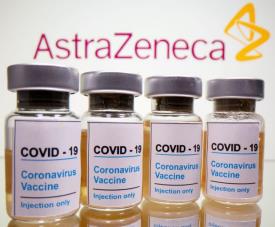 According to an AstraZeneca release on March 22nd, trials conducted in the U.S., Chile and Peru apparently demonstrated 79 percent efficacy in preventing symptomatic infection with SARS-COV-2 virus. The trial involved 32,000 participants with 20,000 receiving the vaccine and 10,000 serving as controls. According to the submission to the NIH –NIAID Data Safety Monitoring Board (DSMB) none of the volunteers receiving the vaccine developed severe symptoms or required hospitalization. The vaccine subjects comprised 79 percent Caucasian, 8 percent African American, 5 percent Hispanic, 4 percent Asian and 4 percent Native American.
According to an AstraZeneca release on March 22nd, trials conducted in the U.S., Chile and Peru apparently demonstrated 79 percent efficacy in preventing symptomatic infection with SARS-COV-2 virus. The trial involved 32,000 participants with 20,000 receiving the vaccine and 10,000 serving as controls. According to the submission to the NIH –NIAID Data Safety Monitoring Board (DSMB) none of the volunteers receiving the vaccine developed severe symptoms or required hospitalization. The vaccine subjects comprised 79 percent Caucasian, 8 percent African American, 5 percent Hispanic, 4 percent Asian and 4 percent Native American.
The submission of data to the DSMB did not include the most recent month relating to the trial. Accordingly the reviewers requested complete data that when included in an analysis reduced the efficacy of the vaccine to a range of 69 to 75 percent from the initially claimed 79 percent. The omission created the impression that AstraZeneca had knowingly “cherry picked” trial data for the U.S. submission. The DSMB took the unusual step of releasing the letter expressing concern relating to incomplete data suggesting a lack of faith in the Company. Obviously the DSMB and the FDA review committee will be stringent in their evaluation of AstraZeneca data.
 Even if Emergency Use Authorization is granted by the FDA it is doubtful whether the product will be marketed in the U.S. There will be sufficient Pfizer, Moderna and Johnson & Johnson vaccines for the U.S. population willing to receive one of the three products.
Even if Emergency Use Authorization is granted by the FDA it is doubtful whether the product will be marketed in the U.S. There will be sufficient Pfizer, Moderna and Johnson & Johnson vaccines for the U.S. population willing to receive one of the three products.
Administration of the AstraZeneca vaccine was suspended for a short period in many European nations during mid-March due to the apparent occurrence of blood clots in some recipients. After evaluation, it was determined that there was no statistical evidence of causation between the vaccine and the vascular manifestation.
The AstraZeneca vaccine is administered in two doses one month apart. Since the vaccine can be stored, transported and held at refrigeration temperature it will be widely used in developing countries avoiding the logistic restraints associated with the ultra-low temperature requirements for the two mRNA products.
Commenting on the results as claimed in the press release, Dr. Ashisa Jha, Dean of the Brown University School of Public Health noted, “If you were rooting for global vaccination this is a good morning.”